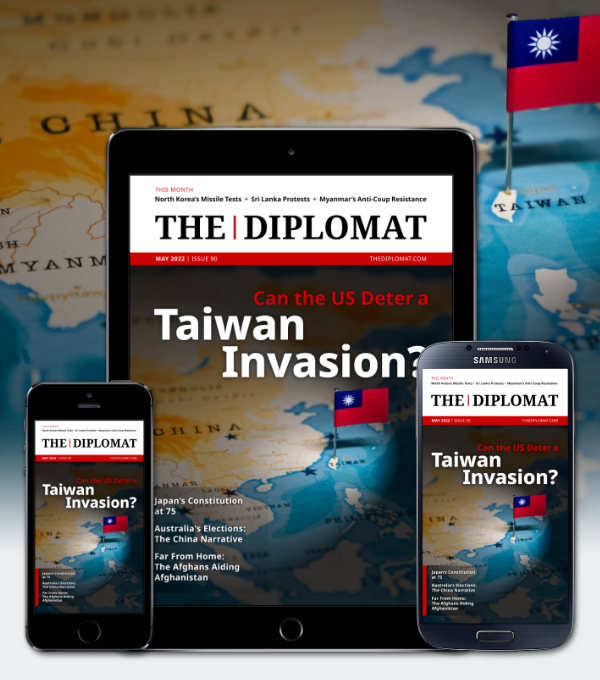| Welcome to the latest issue of Diplomat Brief. This week our top story analyzes Turkmenistan’s new effort to police women’s clothing and make-up. We also have an interview with Erin Murphy, the Indo-Pacific director at the U.S. International Development Finance Corporation, on U.S. relations with Myanmar before, during, and after the country’s democratic reform process. |
| Story of the week |  | SOCIETY Turkmenistan Takes Policing Women’s Bodies to the Next LevelWhat Happened: Since Serdar Berdimuhamedov replaced his father as Turkmenistan’s president, he has reportedly been pushing forward a morality campaign targeting women’s dress and grooming. Among the new restrictions: a ban on eyelash extensions and hair bleaching, among other beauty practices, and a new requirement for women who work for state institutions to forgo make-up and wear only traditional dress. Our Focus: As Akja Kepderi, a scholar and human rights activist from Turkmenistan, explains for The Diplomat, the current campaign is the latest manifestation of Turkmenistan’s attempt to define national identity through the lens of women’s dress, conduct, and general morality. “Perceived unruly female sexuality, in this context, threatens to discredit the nation and damage the honor of men,” she writes. This has led to “moral policing” of women’s daily lives. As one source in Turkmenistan reports, “As soon as you leave your home and enter schools, universities, or state-funded entities, your clothing and appearance are being assessed by strangers. If ‘morality agents’ decide that you have failed to comply with the state’s strict dress code, they will either fine you or take you to the police station.” And when the authorities scrutinize women’s dress and behavior, regular citizens feel empowered to do so as well. Another source adds, “When women take public taxis, the taxi drivers check if the women are wearing balak,” traditional pants. What Comes Next: Turkmenistan has talked the talk on women’s rights, ratifying international conventions on gender equality and enshrining women’s rights in its constitution. In practice, however, women face a severe lack of autonomy due to restrictions on their activities, from choosing what to wear to seeking a driver’s license. Yet while women in Turkmenistan suffer discrimination – including gender-based violence and rape – the government continues to focus its efforts on further restricting their actions in the name of morality and national tradition. Read this story |
| Behind the News | INTERVIEW Erin MurphyErin Murphy, the Indo-Pacific director at the U.S. International Development Finance Corporation and author of the book “Burmese Haze: U.S. Policy and Myanmar’s Opening,” on the U.S. decision to lift sanctions on Myanmar and engage the military: “Looking back, and even with the terrible situation now, I think it was a risk worth taking. This was a country that had been in the dark for decades and this [the reform process in the 2010s] was the first sign that something could open for the people since 1988.” Read the interview |
| This Week in Asia | Northeast Asia Hong Kong Selects Its Next Chief ExecutiveOn May 8, a handpicked group of just over 1,400 elite Hong Kongers will gather to elect the special administration region’s next top leader. This year, the selection process is even less democratic than usual: There’s only one candidate, Chief Secretary John Lee. Lee’s background as security chief during the 2019 protests, which saw numerous cases of police brutality, make him a controversial choice. Lee’s elevation suggests Beijing is ultimately more concerned about maintaining order than solving Hong Kong’s economic and social issues. Find out more | South Asia Sri Lanka Considers No-Confidence MotionAfter over a month of protests demanding the removal of President Gotabaya Rajapaksa and his brother, Prime Minister Mahinda Rajapaksa, Sri Lanka’s opposition has formally filed a no-confidence declaration against the prime minister. The date for a no-confidence vote will be set later this week in Parliament meetings. Since late March, Sri Lanka’s government has been struggling to respond to immense public discontent amid an ongoing economic crisis. The latest development comes after reports that President Rajapaksa had agreed to support his brother’s ouster to save his own political position. Find out more | Southeast Asia The Philippines Elects Its Next PresidentOn May 9, 65.7 million Filipinos will go to the polls to select the country’s next president, following a hard-fought three-month campaign. Barring dramatic late developments, the likely winner is Ferdinand Marcos Jr., the son of the late dictator, who according to Pulse Asia’s latest poll maintains a massive 33-point lead over his closest rival, Vice President Leni Robredo. A Marcos victory would cap off a stunning return for the family, 36 years after Marcos senior was deposed by a popular uprising, and raise uncomfortable questions about the state of Philippine democracy. Find out more | Central Asia Pay Careful Attention to Press Freedoms in Central AsiaIn the latest Reporters Without Borders World Press Freedom Index, the countries of Central Asia all rose in the ranks, Uzbekistan by 24 places(!). But a change in methodology left unmentioned in most media reports makes comparisons with past years difficult and the events of 2021 in the media space of the region don't suggest improvement. Find out more |
| Visualizing APAC |  | According to data from the International Centre for Political Violence and Terrorism Research (ICPVTR) at RSIS, terrorist attacks in Southeast Asia plummeted amid the pandemic. See the full picture |
| Word of the Week | POLITICS བདེ་སྲུངཔ།De-Suup: Dzongkha language; refers to volunteers in Bhutan’s De-Suung (“Guardians of Peace”) program, which has been a major piece of the country’s COVID-19 response. Find out more |
|  |





